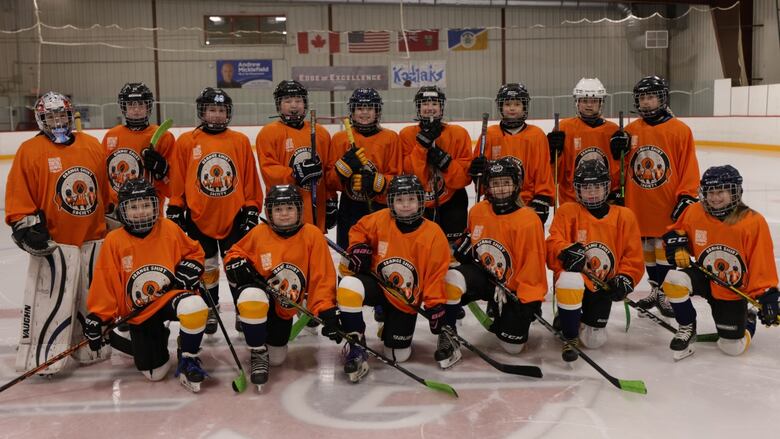Orange jersey project for youth hockey players aims to keep educating people about residential schools
'It's incredibly important to keep the conversation going,' says Orange Shirt Society

Thousands of youth hockey players across the country will soon be flashing past the blue line in orange practice jerseys as they continue to learn about the history and legacy of the residential school system.
The Orange Shirt Society wanted a way to honour Indigenous people's contribution to sport while finding creative ways to educate the public about residential schools, and came up with the Orange Jersey Project.
"It's incredibly important to keep the conversation going and to remember what happened in the past and keep it front and centre for how we move forward," said Melissa Lundy, program manager for the Orange Shirt Society.
The orange practice jerseys have a QR code to direct players and coaches to online educational modules. Most of the educational material will be in video form and will be tailored toward children.
The residential school system was an attempt by the Canadian government and religious institutions to rid Indigenous children of their language, culture and ways of knowing. Many of the children faced emotional, physical and sexual abuse in the schools.

Lundy said they encourage the athletes to speak to their parents and coaches when going through the educational material.
"We hope this just sparks a dialogue and it just grows from there," said Lundy.
The Orange Jersey Project's website says 35 elite athletes will also take part, like NHL players Carey Price and Ethan Bear, to encourage the next generation of athletes.
Lundy said the most challenging part is meeting the demand. So far 500 teams and about 10,000 individual players have reached out to get an orange practice jersey.
The society also has plans to roll out football practice jerseys in the next phase and would like to someday have game day orange team jerseys.
Important for survivors to feel heard
Clark Paul, 75, is Mi'kmaw from Membertou First Nation but has lived most of his life in Eskasoni First Nation. Paul was forced to attend the Shubenacadie residential school for four years.
"I like the idea myself and I like to think other survivors would appreciate the thought and that they are being listened to," he said.

Retired now, Paul worked for almost a decade as a cultural support worker for residential school survivors, reconnecting them to Mi'kmaw culture and spirituality. He said it's important for survivors to feel heard because for so long they weren't believed.
"There are people out there who would like nothing better than to sweep this under the rug," said Paul.
Paul said the presence of orange shirts and jerseys make the opportunities to learn hard to ignore.

